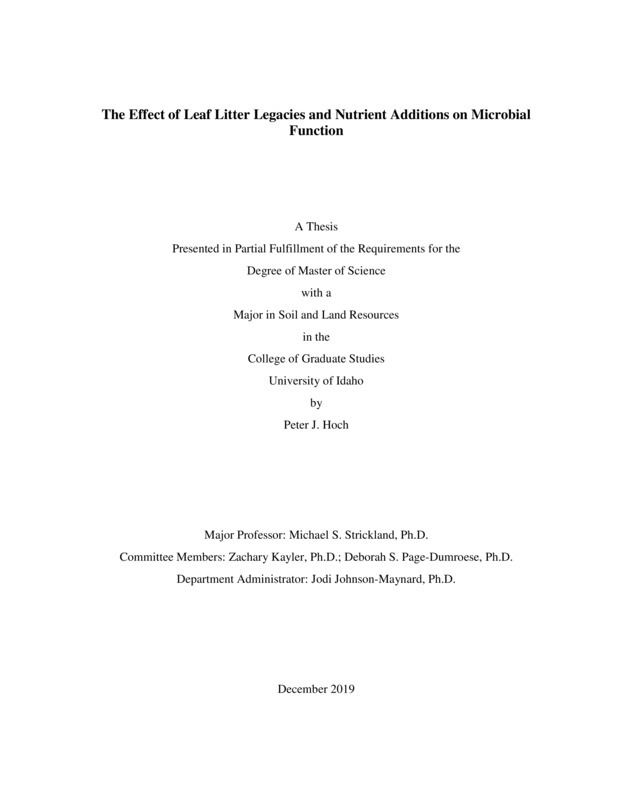The Effect of Leaf Litter Legacies and Nutrient Additions on Microbial Function
Hoch, Peter John. (2019-12). The Effect of Leaf Litter Legacies and Nutrient Additions on Microbial Function. Theses and Dissertations Collection, University of Idaho Library Digital Collections. https://www.lib.uidaho.edu/digital/etd/items/hoch_idaho_0089n_11736.html
- Title:
- The Effect of Leaf Litter Legacies and Nutrient Additions on Microbial Function
- Author:
- Hoch, Peter John
- Date:
- 2019-12
- Embargo Remove Date:
- 2022-07-02
- Program:
- Plant, Soil and Entomological Sciences
- Subject Category:
- Soil sciences
- Abstract:
-
Microorganisms are integral to ecosystem carbon and nutrient cycling, yet we still lack a holistic understanding of the roles microorganisms play in these ecosystem processes. This thesis explores the role microbial communities play in leaf litter decomposition, as well as how micronutrient additions influence the function of microbial communities.
The way that microbes decompose litter can be assessed via the indexes of home-field advantage and functional breadth. Often, past studies have focused on home-field advantage and ignored functional breadth as it is believed that the two are interchangeable. We performed a full factorial leaf litter by soil mesocosm experiment to compare how different microbial communities decompose substrates. We found an unimodal relationship between home-field advantage and functional breadth, as well as several other correlated variables that may help explain the presence or absence of these indexes in other scenarios. This unimodal relationship suggests that these two indexes, while related to each other are not ultimately the same, and should each be considered carefully in future studies.
There is relatively little known about how micronutrients influence microbial communities, compared to the influence of macronutrients. In order to study the influence of micronutrients on microbial communities, we added micro- and macronutient fertilizer inputs to field soils and measured differences in microbial function (i.e., carbon mineralization, substrate-induced respiration, catabolic response profiles). We found that microbial communities responded to the addition of multiple types of fertilizer, rather than just one single type. This response to different nutrients suggests there is a possible colimitation of nutrients.
Understanding how microbial communities regulate decomposition and nutrient cycling is a fundamental question for soil scientists. This work on the relationship between home-field advantage and functional breadth provides insight into a key component of the decomposition process. Similarly, this research on how macronutrients and micronutrients influence microbes shines light on what factors regulate microbial community assembly and diversity. Combined this work provides important insight into the roles and importance of microbial communities in global carbon cycling and ecosystem function.
- Description:
- masters, M.S., Plant, Soil and Entomological Sciences -- University of Idaho - College of Graduate Studies, 2019-12
- Major Professor:
- Stickland, Michael S
- Committee:
- Kayler, Zachary ; Page-Dumroese, Deborah
- Defense Date:
- 2019-12
- Identifier:
- Hoch_idaho_0089N_11736
- Type:
- Text
- Format Original:
- Format:
- application/pdf
- Rights:
- In Copyright - Educational Use Permitted. For more information, please contact University of Idaho Library Special Collections and Archives Department at libspec@uidaho.edu.
- Standardized Rights:
- http://rightsstatements.org/vocab/InC-EDU/1.0/

